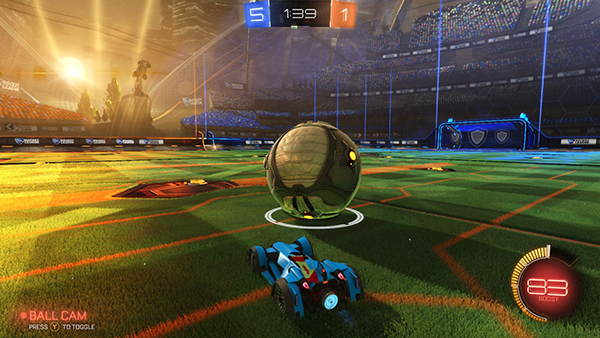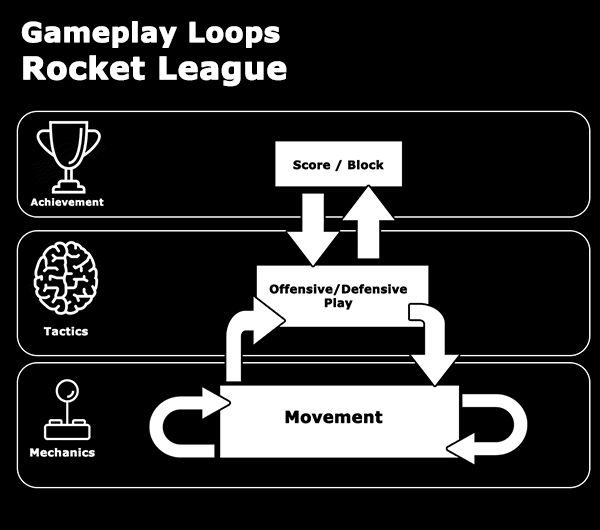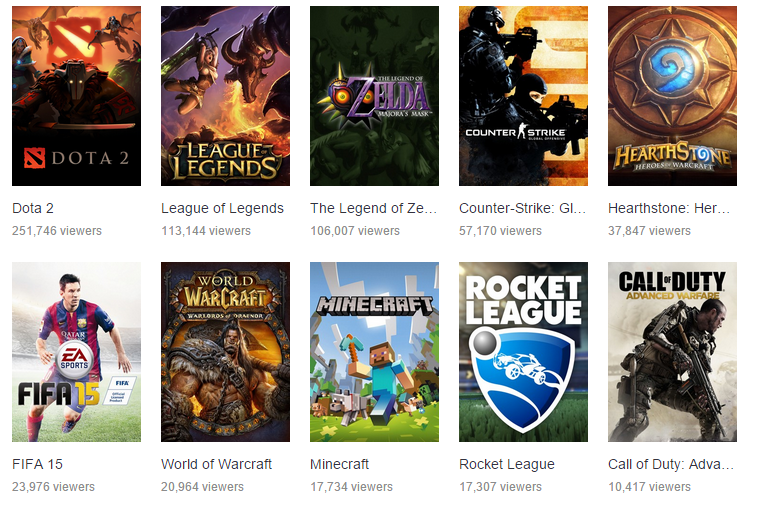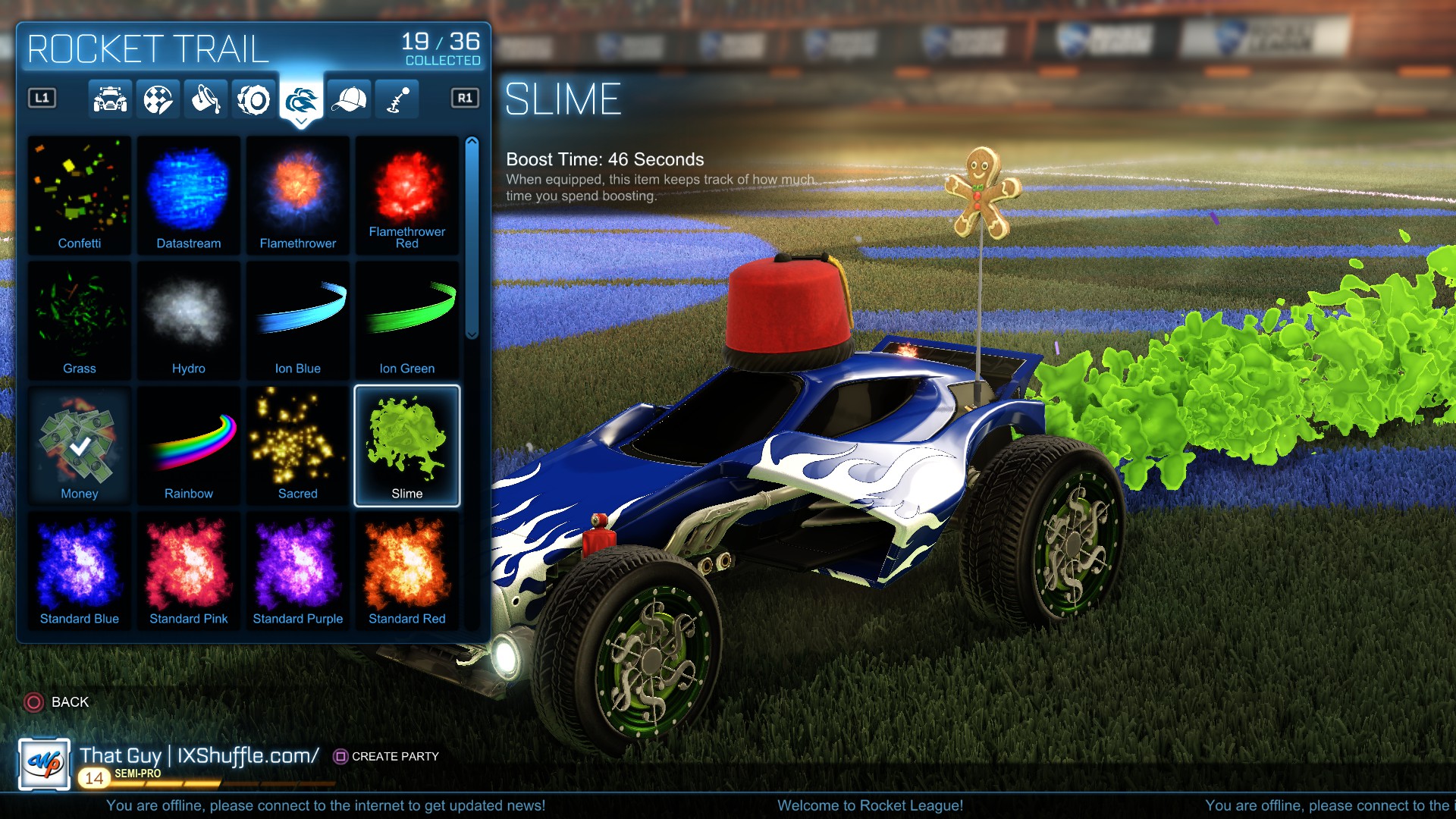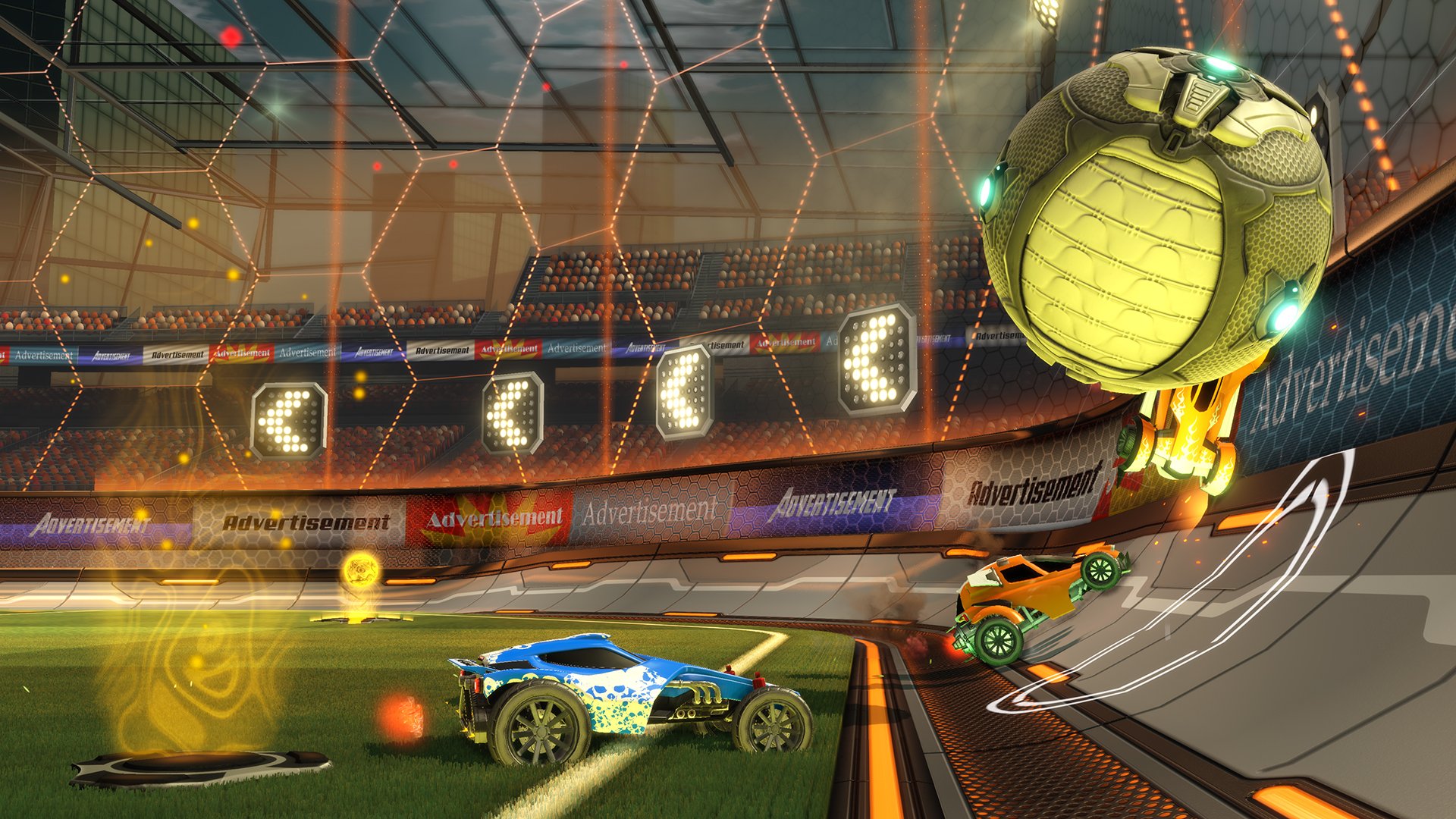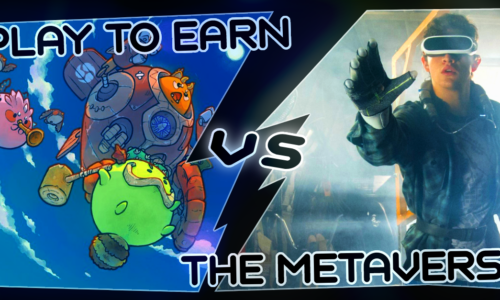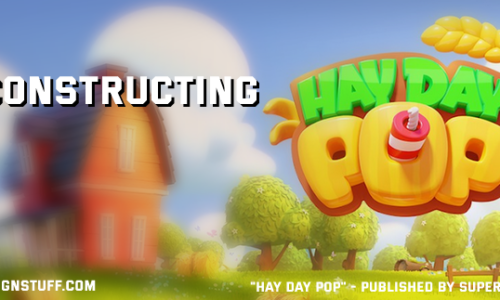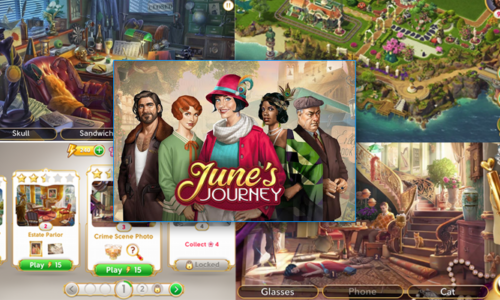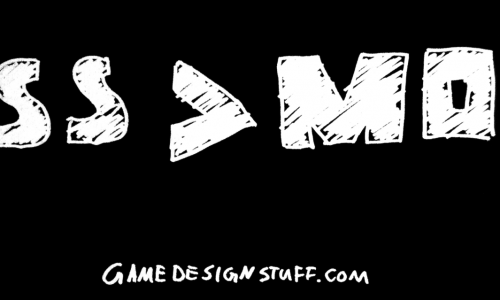Two weeks ago something unusual happened to my gamer alter-ego. I got hooked on a game. The first time in a long time. Many other poor souls seem to have fallen into the same addicting trap called: Rocket League.
Then my Game-Designer alter-ego jumped in and raised the question why this was so much fun. So of course I needed to investigate and dissect what caused this steamrolling success.
I tried to identify the key pillars that are mainly responsible for the current success of the game.
The Game
Rocket League is basically football. With Cars. That can fly. And jump. Players control their car in the 3’rd Person view and try to move the ball into the opponents’ goal by bumping it. Although it offers a single-player-mode it heavily focusses on symmetrical PvP gameplay (Team-Competition or 1vs1).
The fundamental gameplay principles are heavily inspired by real sports. As it is a pure competition of skill in a physical environment with physical challenges. There are no exploit progression mechanics built into the game other than players becoming better at the game (similar to other competitive games).
Accessibility
The main point I will dwell on, is how the Developers of the game have designed it to be incredible accessible. While “Accessible” seems like a contradiction for a game with a competitive audience I will lay out how the designers of rocket league have achieved both. Making an incredible competitive and challenging game while everyone is able to pick it up.
Simplicity
The easiest way is to make a game accessible is to make its rules & systems simple. Rocket League’s core gameplay relies on 2 pillars: Input Execution and Tactics. While tactics are added gradually other the course of the game.
The amount of mechanics players can use in Rocket League is negligible, but because they must be combined to use their full potential: there is a huge “Skill-Space” for players to explore.
The game remains interesting as each mechanic takes a significant amount of time to practice until players can use it purposefully. But the time invested will yield diminishing returns in terms of “skill”. A players skills will eventually stop improving at its “natural limit”. The faster a player learns and adapts, the sooner this point will come. The game has them then either hooked them on the tactical layer, or they will get bored because they have exhausted the games systems. And the only way the game stays interesting is through interesting PVP interaction.
Still, Rocket League does an extraordinary job on getting players to that point. A new player can just pick up the game and have fun and score goals with the most fundamental mechanic: Accelerating and Steering. This is a perfect example of depth & complexity. The game is simple enough to pick up, but then has enough depth that allows players to learn.
Level Design
Although there are some different Maps, they merely differ in their visual and auditory presentation. There are no varying level layouts. Therefore the only key points the player needs to keep in her “spatial”-awareness are the two goals and the fuel-pickups that are also in the same spot on every map. This allows players to focus solely on the ball and tactics (which is challenging enough by itself).
As stated earlier, I believe that these choices were made in order to stay true to the “sports” character of the game. Real life sports rely on the same core pillars: Execution & some layer of tactic. They do not alter the playing field to keep things interesting. It is a contest of pure skill and the ability to “read the game”. Most sports rules are quite simple but have a huge emerging depth from the “input randomness” and different tactics.
Core Gameplay
Each loop is part of a goal hierarchy with the ultimate goal to win the round. In order to win a round, players must score goals and block opponent goal attempts. To achieve this they must gain control of the ball and apply tactics. Goals and core mechanics are strongly tied together (to be expected from a good game, not self-evident though). On the lowest level we have all the movement mechanics (which is basically everything the player can do) is a test of player’s abilities and each test gives players the opportunity to use their skills.
This way, players never truly lose even if they don’t win a match they can find success and recognition for their skills in the small things
And even if they lose, a round – the games longest gameplay-loop – merely being 6 Minutes makes failure less punishing as the time invested is not too high and the next short round is just one click away.
The lack of an in game-economy eliminates potential “kingmaking” mechanics other games would have to fight with negative-feedbackloops. And the short rounds allows the design to make “comebacks” a core element of the games narrative.
2 Sources of Fun
There are 2 main Sources of fun: Success and Mastery.
One informs another but they are separated. Fun from Success happens through winning, scoring or otherwise dominating the opponent. The downside of “Fun from success” in a PvP-based game is that the success of the one team is the forfeit of the other team. This is called a zero sum -game. Fortunately, the sum of fun in Rocket League is >0. The reason for that is the “fun from mastery”. Players have the chance to have small successes by using tactics / mechanic-combinations that they have learned by that time. Fun can be experienced in all of the games loops. Additionally the game rewards certain action such as a pass to the center, or a save with points which accumulate to a player’s point-rating at the end of the match.
Another element that makes “Mastery” such a strong motivator in Rocket League is that the Acquired Skill is the actual progression of the game. Yes, the ladder also lets player progress, but this is merely a measurement of the players skills compared to others. And a ladder system implies that a player’s rank can decline. But it is unlikely that the skill of a player declines.
This principle is not unique to Rocket League, if you think about any successful competitive PvP game – player-skill-progression as a main motivator is what they all have in common.
Randomness
The Core of Rocket Leagues gameplay lets players interact with physically simulated objects. The car being the avatar with controlled in various ways. And a Sphere. This physically accurate simulated game world is highly chaotic where a slight alternation of inputs, create very different results. Together with rather imprecise player-inputs this opens up the room for many random & and uncertain events. The player is never 100% sure into what results her inputs will end. Of course it is not physically random since the physical simulation is deterministic. But so is the roll of a die in the real world. But by just alternating some of the input parameters (speed, angle, height of throw) we can produce nearly random results. Getting the balance right between random & intended results of physically interacting player controlled objects was probably one of the challenges when polishing Rocket Leagues Gameplay. Having some degree of randomness comes in handy in 3 ways:
- This randomness can create lucky moments such as unexpected goals, spectacular saves or otherwise funny and thrilling events which adds a very interesting layer to the games narrative that is otherwise merely constructed by the skill & tactics of the players.
- Fairness; The more uncertain the feedback for a particular input is, the more casual/newbie friendly it becomes. This way the game allows also beginners to have some success against opponents at a slightly higher skill level. I think Rocket League hits the sweet spot between Skill & Randomness for their target audience.
- Reducing randomness becomes the long-term goal of players on their path to master the game
When advancing, and player are able of hitting the balls more accurate, tactic and strategy become more important as they require a certain amount of mastery to be executed.
Matchmaking
All of the previous stated would lead to a total mess if the matchmaking was not near to perfect. Newbies would be crushed by skilled players leading to frustration for both player types. While Pro’s wouldn’t finding meaningful challenge and newbies not finding any success.
Players progress at their own pace in the matchmaking system. They will mostly find a challenging opponent at their skill level. But players can still learn strategies from each other. Which leads to small but continuous skill improvements. The games power curve is controlled through the matchmaking system. It determines how fast players can learn new strategies.
Emerging Tactics
One remarkable fact about Rocket Leagues design is that all cars are basically the same. Many games try to introduce tactics & roles by implementing Rock-Paper-Scissor Elements (RTS-Factions)or by Interdepending classes (Team Fortress Classes), or by a complex Counterplay-Systems as in League of Legends.
Not forcing players to pick a role creates freedom but also the necessity to work together as a team more closely. Example: There is no “goalie” car, which is bigger, or can jump quicker. If there was, that player would be doomed to play defensively the whole match. This does not only reduce choices for that player, also the tactical depth of the whole match would be harmed. As reacting quickly to opponents counter-attacks by building a defense quickly becomes less of a challenge.
Training Modes
There are a couple ways players can learn about a certain mechanics (or the way to combine them in order to). They either see another player in multiplayer use it, they find out by experimenting themselves and then there is the training mode. A very nice way to teach players advanced mechanics.
The trick here is that the game never explicitly tells the player how to use the mechanics, instead it puts the player into a specific situation in which there is basically just one solution for the player. E.g. in the goal training the player spawns in the goal and a huge canon shoots the ball into the goals direction. The task is clear, now players need to figure out how to do it. Also the feedback whether they succeeded or not is quite clear.
Viewability
I think one of the reasons for Rocket Leagues current success is that it was picked up by many Streamers on Twich.tv The main reason for that being of course that picked it up because it was simply fun. And increased popularity also increases chance of streamers playing it. So View-ability plays a role in popularity but is not the sole cause. What makes Rocket League such a good-to-watch game?
- The drama mentioned earlier, with an entertaining streaming, the drama created by the gameplay is even enhanced and is entertaining
- Easy to understand: Get the ball into the goal there is no research required in order to get into the meta of Rocket League
Car Customization
Players want to differentiate. In a game so heavily depending on symmetric abilities, this individualism must come from elements that don’t affect the gameplay. Rocket League satisfy the players need to show off and underpin their social status by offering a bunch of unlockable customizations for their cars: decals, colors, particle effects and of course hats.
Every time a goal has been shot, the game shows a recap of the last couple of events in slow motion. Since in the otherwise fast paced game details such as the specular mapping for car decals can go by unnoticed, these are the perfect moments for players to show off their car.
Although they are not many ways to customize the cars it is sufficient so that every player can create something unique (And I bet they will add more cars & customizations later)
Conclusion
The best thing about the game, might be what will cause its downfall eventually: Its simplicity.
Player progress until their Skill Plateaus – since there are no other progression mechanics, this is when the game starts to get boring. The only way they can “get something” out of the game is by succeeding and winning matches. Since the matchmaking works quite well players will win maybe half of the time (depending on their skill-level). So a player’s skill ultimately determines how long the game is enjoyable.
By adding more game modes this problem could become less imminent because it would allow players to maybe become good at another game mode instead. So players could find their “niche” that they enjoy.
How do other competitive games solve this problem? – More Content. Mobas add more heroes, CS:GO adds more maps, and StarCraft adds more Units & Builds + More Maps. Adding more content will be difficult in Rocket League because the systems are not built around interesting levels, abilities or units.
This is why I think that adding additional game modes is the way to go (e.g. a Golf Mode, Tennis, or Volleyball etc).
Overall Rocket League is a very tightly designed game with exactly the right mechanics that it needs to be fun and engaging for a competitive core audience.




